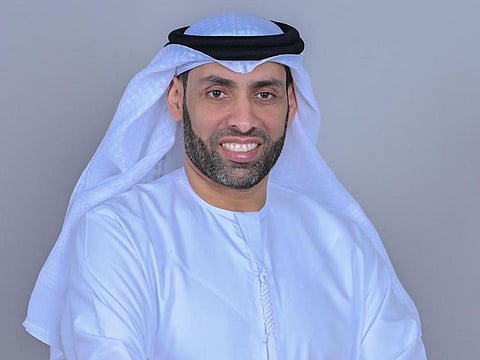Meet Emirati oncologist Prof Humaid Al Shamsi of global fame
UAE's only certified gastrointestinal oncologist, he has many firsts to his credit

Abu Dhabi: In the heart of Abu Dhabi’s medical innovation hub, Burjeel Medical City, sits Prof. Humaid Al Shamsi, an oncologist of global repute. A distinguished figure, he wears many hats - as Founder and Director of the Medical Oncology Service at Burjeel Medical City, President of the Emirates Oncology Society and Adjunct Clinical Professor of Oncology at the College of Medicine at the University of Sharjah.
In an exclusive interview with Gulf News, Prof. Al Shamsi’s shared his journey of success. He began with an exceptional achievement - earning his medical degree with honours from the University of Cork, The National University of Ireland, in 2005. His pursuit of excellence took him across the globe, where he completed his Internal Medicine Residency at McMaster University in Hamilton, Canada.
His pursuit of knowledge led him to an advanced training programme in general oncology, followed by specialised training in gastrointestinal oncology and palliative care. He then joined MD Anderson Cancer Centre at the University of Texas, serving as an Assistant Professor in the Gastrointestinal Medical Oncology department from June 2014 to December 2016.
Adding to his impressive list of credentials, Prof. Al Shamsi became the first graduate of the late Sheikh Khalifa Bin Zayed’s programme for outstanding UAE Physicians in 2016. He holds a board certification from the US, Canada and the UK for medical oncology and internal medicine, and is recognised as the only certified Gastrointestinal Oncologist in the UAE.
Passion for public service
Beyond his medical practice, Prof. Humaid Al Shamsi passionately advocates for public awareness of cancer, early detection and screening. His efforts have reached the masses through numerous TV interviews, social media awareness campaigns, and newspaper features.
He serves as an Advisor and Member of Governmental Committees at the Department of Health - Abu Dhabi, Dubai Health Authorities, and the Ministry of Health. He is a Member of the Steering Committee on National Cancer Control indicators since January 2018, aiming to elevate the quality of cancer care and provide comprehensive treatment for patients in the UAE and the broader region.
Why oncology?
Reflecting on his choice to specialise in oncology, Prof. Al Shamsi says he owes to “an excellent mentor” during his medical school years. “Upon returning to the UAE, I noticed a shortage of UAE-based oncologists. This made me enter the field of oncology and contribute to cancer care,” he said.
As the first Emirati to be trained in palliative care, Prof. Al Shamsi emphasises its relevance in treating cancer patients. “Palliative care is a specialised approach aimed at enhancing the quality of life for individuals facing serious illnesses, including cancer. It provides relief from symptoms, pain and the emotional stress associated with the disease, regardless of the stage or prognosis,” he explained.
Importance of palliative care
According to him, palliative care plays a multifaceted role in cancer treatment:
Symptom Management: Palliative care teams work with oncologists to manage physical symptoms effectively, enhancing patient comfort and well-being.
Emotional and Psychological Support: Palliative care addresses emotional challenges, providing counseling and emotional support for patients and their families.
Communication and Decision-Making: It facilitates clear communication between patients, families, and healthcare providers, empowering informed decisions about care.
Holistic Care: Palliative care takes a holistic approach, considering physical, emotional, social, and spiritual aspects of well-being.
Continuity of Care: It can be provided alongside curative treatments, ensuring uninterrupted care throughout the cancer treatment journey.
Continuous learning
Prof. Al Shamsi’s journey is marked by continuous learning, commitment to raising cancer awareness and improving the lives of cancer patients through palliative care. His efforts to raise cancer awareness have left an indelible mark. He boasts a substantial social media presence, using platforms like Instagram, TikTok, Twitter, and LinkedIn to disseminate information about cancer, its risk factors, early detection and screening.
Asked about the persistent challenge in the fight against cancer, especially in advanced stages, he said the complexity of cancer, with numerous types and subtypes, require tailored treatments, from chemotherapy and targeted therapy to radiation and immunotherapy. “It’s a multifaceted battle,” he said. A battle that he is on the forefront of, championing the cause for improved cancer care and awareness in the UAE and beyond.
Sign up for the Daily Briefing
Get the latest news and updates straight to your inbox



